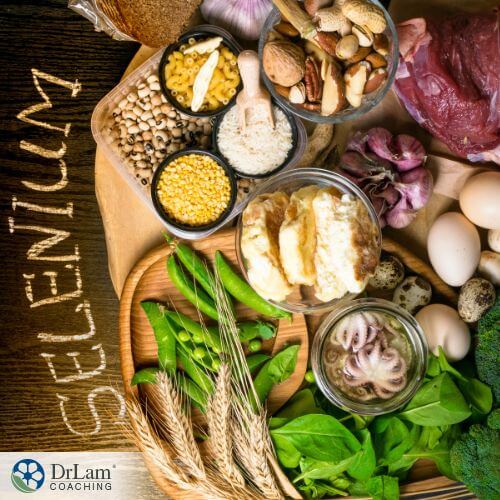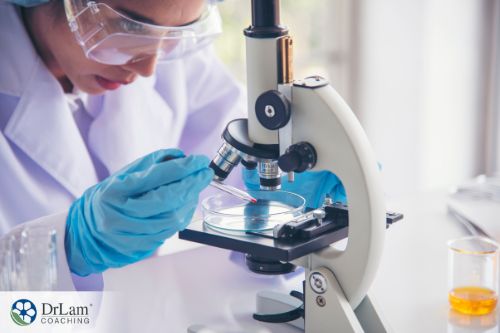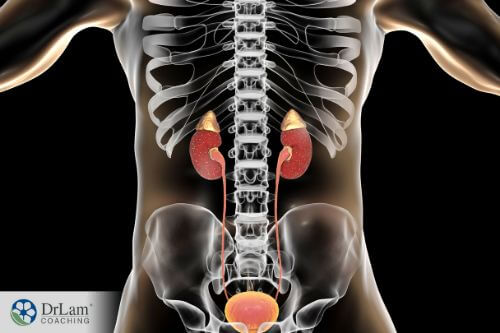 Your body needs this trace mineral, but until recently, we haven't known exactly how helpful selenium is for preventing the effects of aging. Several studies are now supporting the idea that selenium is part of a group of key compounds that protect your body from the effects of aging. It may protect your skin, keep telomeres long, remove faulty proteins from the body, and more. Here's what you need to know about the anti-aging benefits of selenium.
Your body needs this trace mineral, but until recently, we haven't known exactly how helpful selenium is for preventing the effects of aging. Several studies are now supporting the idea that selenium is part of a group of key compounds that protect your body from the effects of aging. It may protect your skin, keep telomeres long, remove faulty proteins from the body, and more. Here's what you need to know about the anti-aging benefits of selenium.
Your body stores selenium in your muscles. Your teeth enamel and nails have traces of it, too. Further, your spleen, heart, kidney, and liver contain selenium. Your thyroid gland, though, has the highest concentration.
Selenoproteins are a group of proteins and enzymes that have a high content of selenium. These proteins may be behind many of the protective anti-aging benefits of selenium.
Several studies suggest that selenoproteins can reduce chronic inflammation linked to aging and have antioxidant effects. They may help keep telomeres long, the caps on the ends of DNA that are connected to reducing DNA damage associated with aging. And they may play an essential role in ridding the body of incorrectly folded proteins, which accumulate with age and can cause age-related health problems. Selenoproteins also appear to protect skin from UV damage from the sun, reducing the appearance of fine lines, wrinkles, and even skin cancer in some cases.
Research has found that it has antioxidant properties. It helps neutralize free radicals and slows aging down. The imbalance of free radicals causes age-related health problems and premature skin aging. Free radicals also cause inflammation when left unchecked. Long-term inflammation can eventually damage your healthy cells resulting in diseases like arthritis and cancer.
Selenium helps scavenges free radicals through contributing to the creation of selenoproteins. Removing these free radicals leads to decreased cell and DNA damage as you age. One study shows it can slow down aging and prevent age-related diseases like skin aging, heart disease, tumors, and neuropsychiatric problems.
A 2021 review found selenoproteins can regulate and remove misfolding proteins associated with Alzheimer’s and type-2 diabetes. These conditions occur partly because the body amasses misfolded proteins as it grows older. These are abnormal changes in protein caused by many factors, like oxidative stress. Removing these proteins may reduce your risk of developing Alzheimer's and diabetes.
Telomeres also show signs of aging. Telomeres protect your body’s chromosome ends. But as your cells divide, your telomeres get shorter. When the telomere no longer protects the end of the chromosome, the cell soon dies as it can no longer divide. A 2020 study showed that increased selenium intake was associated with longer telomeres.
Some studies suggest selenium may contribute to keeping your organs and body healthy as you age.
Your thyroid gland contains more selenium than other organs. It is involved in growth, development, and metabolism. It releases thyroid hormones for energy, depending on the amount you need. Increased thyroid hormone is also vital for pregnant women.
Some studies suggest that people suffering from thyroid disorders including hyperthyroidism, hypothyroidism, and Hashimoto's thyroiditis can also benefit from taking selenium. A review of studies found that those with Hashimoto’s disease that took selenium supplements along with their levothyroxine, a synthetic thyroid medication, for three months had improved mood and well-being.
However, additional research is needed to establish how accurate this conclusion is. So, it is best to talk to your doctor before taking selenium for thyroid problems.
 Selenium may help prevent cancer due to its protective effect on cells, although studies show conflicting results.
Selenium may help prevent cancer due to its protective effect on cells, although studies show conflicting results.
For example, a 2016 meta-analysis shows it could lower cancer risk. But high selenium may have different effects on various kinds of cancer. In contrast, a 2018 review found no solid evidence that increasing selenium from food or supplements prevented cancer in people. Other studies found selenium may actually increase cancer risk
Thus, more studies are needed to confirm the link between selenium and cancer prevention.
Your serum selenium levels drop as you age. This low selenium level may be linked to brain function decline, such as in the case of Alzheimer’s, a kind of dementia. One study found a large percentage of adults with dementia had selenium deficiency. Another study by Queensland’s Brain Institute in mice suggested that a selenium supplement could help reverse cognitive deficits due to stroke and grow new neurons.
However, other large-scale reviews have failed to find a consistent connection between selenium and cognitive improvement, suggesting that more research is needed.
Low levels of selenium have been associated with a higher risk of heart problems such as heart failure and narrowing of artery walls due to plaque buildup. However, a review of studies focusing on selenium supplements alone found that they did not appear to have a helpful effect on your risk of heart attack or other cardiovascular problems.
Your body does not produce selenium. You need to get it from food, and the selenium content of food depends on the selenium levels in the soil. The more selenium in the soil, the higher the selenium quality in plant-based sources.
Here are some foods that often contain selenium:
Moreover, Brazil nuts top the list of selenium food sources. About 6-8 nuts boast 544 mcg of selenium. This is equivalent 989% of the recommended Daily Value (DV). So eating one Brazilian nut alone may contain around 77 mcg of selenium, and easily suffices for the recommended DV of 55 mcg.
Most Americans have sufficient selenium intake. The US generally has selenium-rich soil, except for in some regions. However, there may be cases when people do not get adequate amounts of selenium from their food. Selenium deficiency is rare in the US, but some people can be at risk.
Symptoms include brain fog, fatigue, infertility, muscle weakness, hair loss, and a weak immune system.
If you have these symptoms, you should talk to your doctor. One option is a blood glutathione peroxidase test to know if you are lacking selenium. You could also request a micronutrient test.
All you need is 55 mcg of selenium daily. Pregnant women need 60 mcg, while breastfeeding women need 70 mcg.
Many multivitamins contain selenium, and there are also stand-alone selenium supplements. For example, chelated selenium supplements are formulated for better absorption and stomach comfort. They are best taken with meals. Moreover, selenium supplements go well with vitamins A and E to increase the effect.
However, taking more than 200 mcg of selenium poses health problems. It can cause selenosis with symptoms of hair, white spots on nails, nausea, digestive problems, and fatigue. Some studies also showed supplements increased the risk of skin cancer, prostate cancer, and type-2 diabetes risk.
You should always talk to your doctor before taking a new supplement. This is especially true of selenium, which may have both benefits and drawbacks. The safest way to get it is from food, but even Brazil nuts should be eaten in moderation to avoid selenosis.
 Adequate levels of selenium may help fortify your body against some of the effects of stress.
Adequate levels of selenium may help fortify your body against some of the effects of stress.
Stress is addressed in the body by the NeuroEndoMetabolic (NEM) stress response. It is composed of six circuits of related organs and systems that help you fight stress. One of these is the Hormone Circuit. It includes your adrenals, thyroid glands, and reproductive organs. These glands release hormones for specific body functions. Dysfunction of one of these organs can affect the others. For example, weak adrenal glands can lead to thyroid problems. Over time, this can lead to Adrenal Fatigue Syndrome (AFS). AFS can lead to a range of severe symptoms that affect your daily life.
Under and overactive thyroid hormones are examples of thyroid problems. They are connected to low levels of selenium. Additionally, the occurrence of thyroid problems increases with age.
Selenium from foods and supplements can give you the amount you need to help prevent thyroid problems. Moreover, selenium’s antioxidant actions contribute to slowing down aging and age-related diseases.
Selenium as an antioxidant slows aging and helps prevent age-related health problems. It does not naturally occur in your body. So will have to get it from your diet or supplements. However, supplements work best for people who are selenium deficient. You may or may not notice symptoms of selenium deficiency.
While low selenium does seem to co-occur with certain health problems, the jury is still out as to whether it actually causes those health problems, or whether more selenium alone would help. Research is not conclusive at this time.
To get more info on possible nutrient deficiencies and a healthy, anti-aging diet, you can talk to a member of our Dr. Lam Coaching Team for a free consultation at +1 (626) 571-1234.
Selenium has antioxidant properties that slow down aging and help prevent the development of age-related health problems. It may help protect telomeres and scavenge improperly folded proteins from the body. However, not all research is so positive, and some even show selenium increases the risk of certain health conditions.
